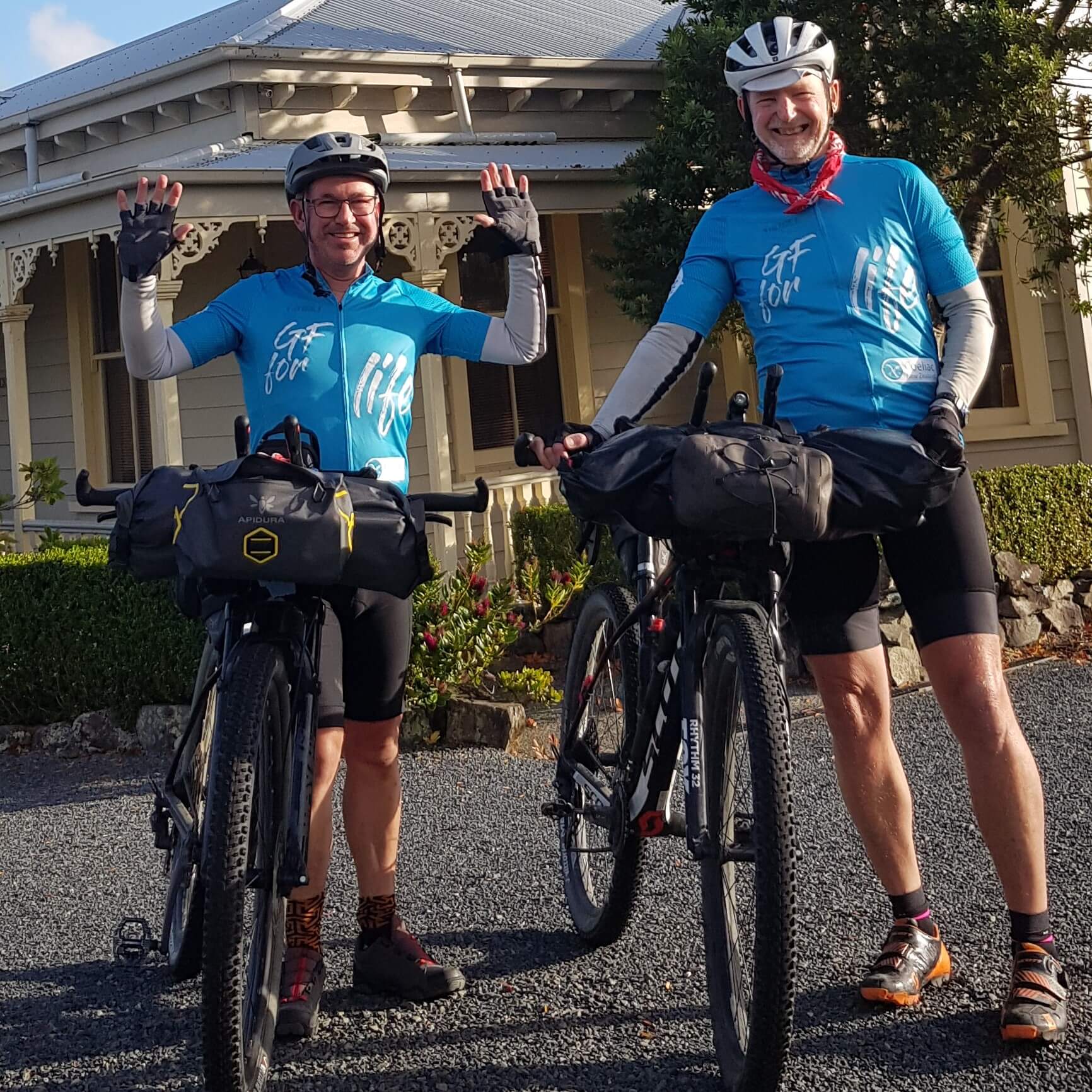

Coeliac NZ board member Max Smitheram was contacted by a friend Andrew Trevelyan to join him on the 3,000 km ‘Tour Aotearoa’ cycle route from Cape Reinga to Bluff. Max was lured into the adventure of this world class ride knowing he would have the opportunity to test his endurance, grit, and the ability to self-manage living with coeliac disease. Andrew decided if Max had to manage all the dietary challenges of being coeliac safe and gluten free as well as preparing physically and mentally for the challenge that he would support Max by also eating gluten free, at least at cafes and restaurants along the way. It would be a Gluten Free for Life Ride to raise awareness and funds for Coeliac NZ so they could support others living with coeliac disease to live their best life.
With only 17 weeks to prepare for the ultra-distance event Max identified early on in his event preparation that he would need expert training advice and monitoring. He contacted Coeliac NZ’s Health Promotion Manager, Lisa Jury (who also holds a PG Cert. Health Science specialising in Sport and Exercise) to get a training programme.
Lisa realised at first meeting with Max, that having only 17 weeks to prepare for this ultra-distance event was going to be difficult. Given her experience, she was happy to write his training plans and to monitor his progressions. Below Lisa explains some tips for someone with coeliac disease preparing for an event like this.
Building a Physical Fitness-Base
Building your aerobic capacity is key. Developing your aerobic system and muscle endurance helps you to resist fatigue for the long haul. Utilizing a functional training plan specific to ultra-endurance cycling was what Max needed. This type of plan involves more than just a training programme, it involves dedication, building his physical fitness base, mental preparation, and preparation for adherence to a gluten free diet that gives him enough energy and nutrients for sustenance throughout this 3000km event.
Bikepacking
Max and Andrew were planning on being self-sufficient and carry all their gear required on their bikes, so preparing to ride with your bike fully loaded (tent, clothing, food, drink, cooking equipment) and as light as possible is essential prior to the event. Then you can see how you handle the extra weight, cornering upward climbs so that you are confident before you start the event. This is done after your base is built and some hill work is done to build strength in your legs and to reduce injury.
Mental Preparation
Looking at the magnitude of the event and mentally preparing for the obstacles you may face, helps when something doesn’t go exactly how you planned it. At the end of the day cycling day after day fully loaded with gear, in all weather and terrain, it takes perseverance and dedication to the cause to keep going. It is also important to prepare mentally for any weather event, mechanical hiccups, injury (crash) or health concern before you leave.
Gluten Free Diet Preparation
We know how important nutrition is to us for health and the degree of adaptation to exercise also depends upon the food that fuels our exercise and allows these adaptations to occur. Plan your meals in advance and do it at the beginning of the week. Plan and eat those foods you’re planning to eat while you’re away on your ride. Consistency is key for you on a gluten free diet.
Carbohydrates are the most important fuel of the body and the first energy source used when doing exercise or sport. About 60% of the food, you eat should be carbohydrates. Proteins are the basic building blocks of all body cells and are needed for the growth and repair of body tissues. Get your protein from both plant and animal sources.
Keep hydrated: 6-8 glasses of plain water per day is recommended. When exercising more may be required. Exercise over 1.5 hrs you may require a sports drink. Don’t forget to drink what you will drink on the ride so your body is used to it.
Approximately 70% of our body’s weight is water. The main purpose of drinking water is to maintain this level and ‘’stay adequately hydrated”. When exercising for long periods at a moderate intensity you need to replace the water lost. Dehydration can restrict how hard the heart can work, and in the heat of summer, we need to drink more. Tap water is free, safe and has no calories.
CARBO LOADING: is where you consume a large quantity of carbohydrates, (wholegrains, pasta, rice, breads, cereals, starchy vegetables like potatoes, kumara, corn and legumes, beans, fruit, fruit juice) to increase stores of glycogen in muscles the week prior to the event start date. Because this is not like a marathon where the event is over the same day, it is still important to do this and then to keep your carbohydrates up throughout the event for sustained energy.
Photo: Max (left) and Andrew (right) on Day 3 of their Gluten Free for Life Ride. You can join them along their 300km journey by logging into the Tour Aotearoa website - and typing in Maximus Smitheram.